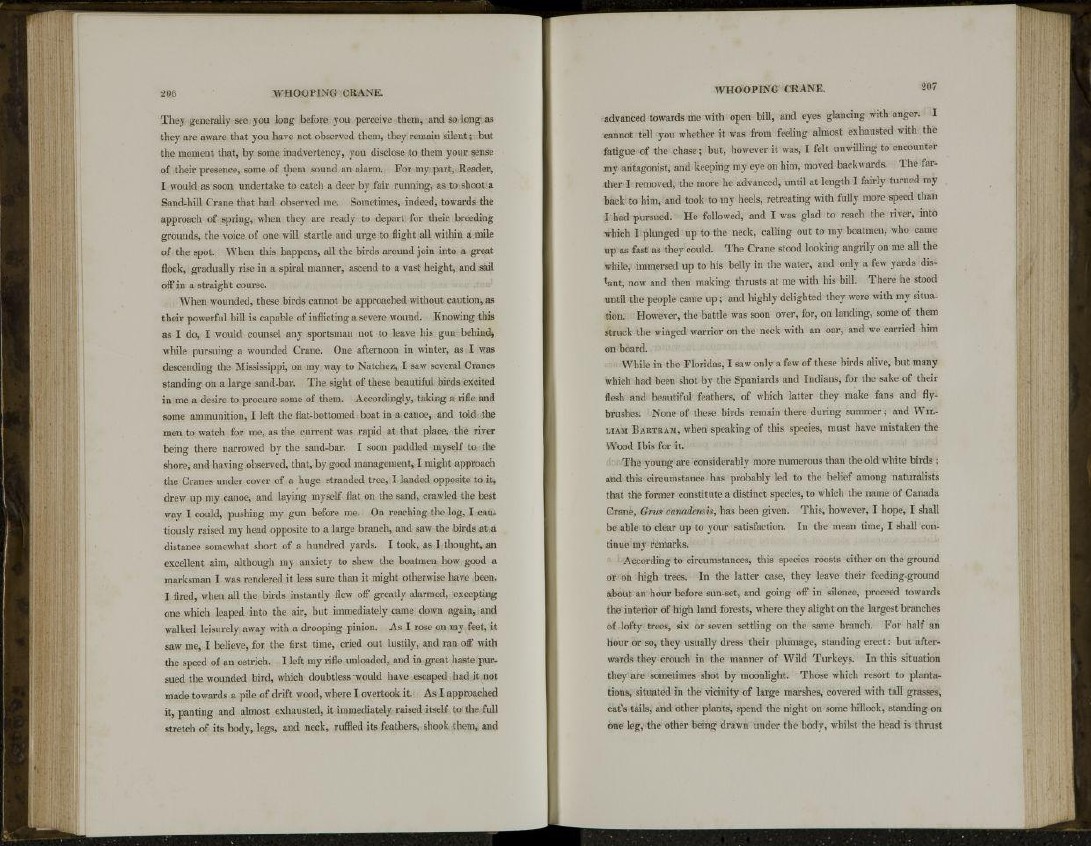
WHOOPING CRANE.
They generally see you long before you perceive them, and so long as
they are aware that you have not observed them, they remain silent; but
the moment that, by some inadvertency, you disclose to them your sense
of their presence, some of them sound an alarm. For my part, Reader,
I would as soon undertake to catch a deer by fair running, as to shoot a
Sand-hill Crane that had observed me. Sometimes, indeed, towards the
approach of spring, when they are ready to depart for their breeding
grounds, the voice of one will startle and urge to flight all within a mile
of the spot. When this happens, all the birds around join into a great
flock, gradually rise in a spiral manner, ascend to a vast height, and sail
off in a straight course.
When wounded, these birds cannot be approached without caution, as
their powerful bill is capable of inflicting a severe wound. Knowing this
as I do, I would counsel any sportsman not to leave his gun behind,
while pursuing a wounded Crane. One afternoon in winter, as I was
descending the Mississippi, on my way to Natchez, I saw several Cranes
standing on a large sand-bar. The sight of these beautiful birds excited
in me a desire to procure some of them. Accordingly, taking a rifle and
some ammunition, I left the flat-bottomed boat in a canoe, and told the
men to watch for me, as the current was rapid at that place, the river
being there narrowed by the sand-bar. I soon paddled myself to the
shore, and having observed, that, by good management, I might approach
the Cranes under cover of a huge stranded tree, I landed opposite to it,
drew up my canoe, and laying myself flat on the sand, crawled the best
way I could, pushing my gun before me. On reaching the log, I cautiously
raised my head opposite to a large branch, and saw the birds at a
distance somewhat short of a hundred yards. I took, as I thought, an
excellent aim, although my anxiety to shew the boatmen how good a
marksman I was rendered it less sure than it might otherwise have been.
I fired, when all the birds instantly flew off greatly alarmed, excepting
one which leaped into the air, but immediately came down again, and
walked leisurely away with a drooping pinion. As I rose on my feet, it
saw me, I believe, for the first time, cried out lustily, and ran off with
the speed of an ostrich. I left my rifle unloaded, and in great haste pursued
the wounded bird, which doubtless would have escaped had it not
made towards a pile of drift wood, where I overtook it. As I approached
it, panting and almost exhausted, it immediately raised itself to the full
stretch of its body, legs, and neck, ruffled its feathers, shook them, and
WHOOPING CRANE. '207
advanced towards me with open bill, and eyes glancing with anger. I
cannot tell you whether it was from feeling almost exhausted with the
fatigue of the chase; but, however it was, I felt unwilling to encounter
my antagonist, and keeping my eye on him, moved backwards. The farther
I removed, the more he advanced, until at length I fairly turned my
back to him, and took to my heels, retreating with fully more speed than
I had pursued. He followed, and I was glad to reach the river, into
which I plunged up to the neck, calling out to my boatmen, who came
up as fast as they could. The Crane stood looking angrily on me all the
while, immersed up to his belly in the water, and only a few yards distant,
now and then making, thrusts at me with his bill. There he stood
until the people came up; and highly delighted they were with my situation.
However, the battle was soon over, for, on landing, some of them
struck the winged warrior on the neck with an oar, and we carried him
on board.
While in the Floridas, I saw only a few of these birds alive, but many
which had been shot by the Spaniards and Indians, for the sake of their
flesh and beautiful feathers, of which latter they make fans and flybrushes.
None of these birds remain there during summer; and WILLIAM
BARTRAM, when speaking of this species, must have mistaken the
Wood Ibis for it.
The young are considerably more numerous than the old white birds ;
and this circumstance has probably led to the belief among naturalists
that the former constitute a distinct species, to which the name of Canada
Crane, Grus canadensis, has been given. This, however, I hope, I shall
be able to clear up to your satisfaction. In the mean time, I shall continue
my remarks.
According to circumstances, this species roosts either on the ground
or on high trees. In the latter case, they leave their feeding-ground
about an hour before sun-set, and going off in silence, proceed towards
the interior of high land forests, where they alight on the largest branches
of lofty trees, six or seven settling on the same branch. For half an
hour or so, they usually dress their plumage, standing erect: but afterwards
they crouch in the manner of Wild Turkeys. In this situation
they are sometimes shot by moonlight. Those which resort to plantations,
situated in the vicinity of large marshes, covered with tall grasses,
cat's tails, and other plants, spend the night on some hillock, standing on
one leg, the other being drawn under the body, whilst the head is thrust